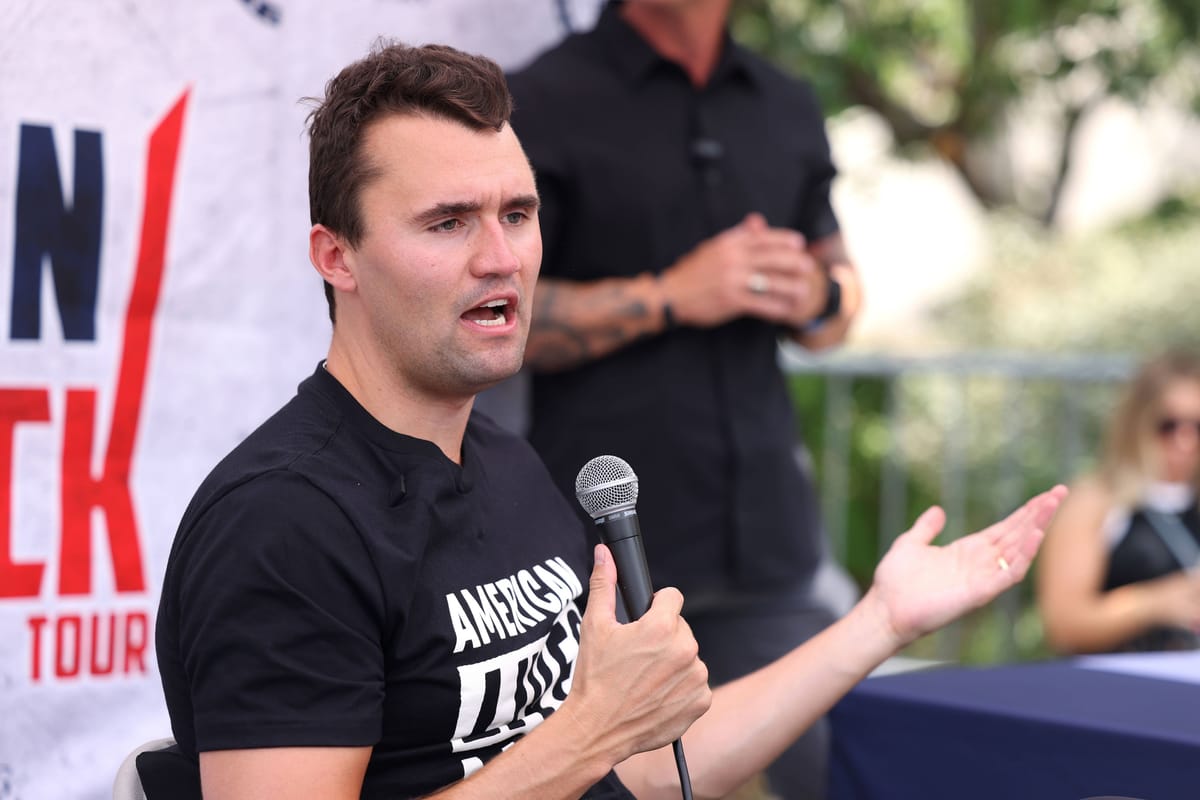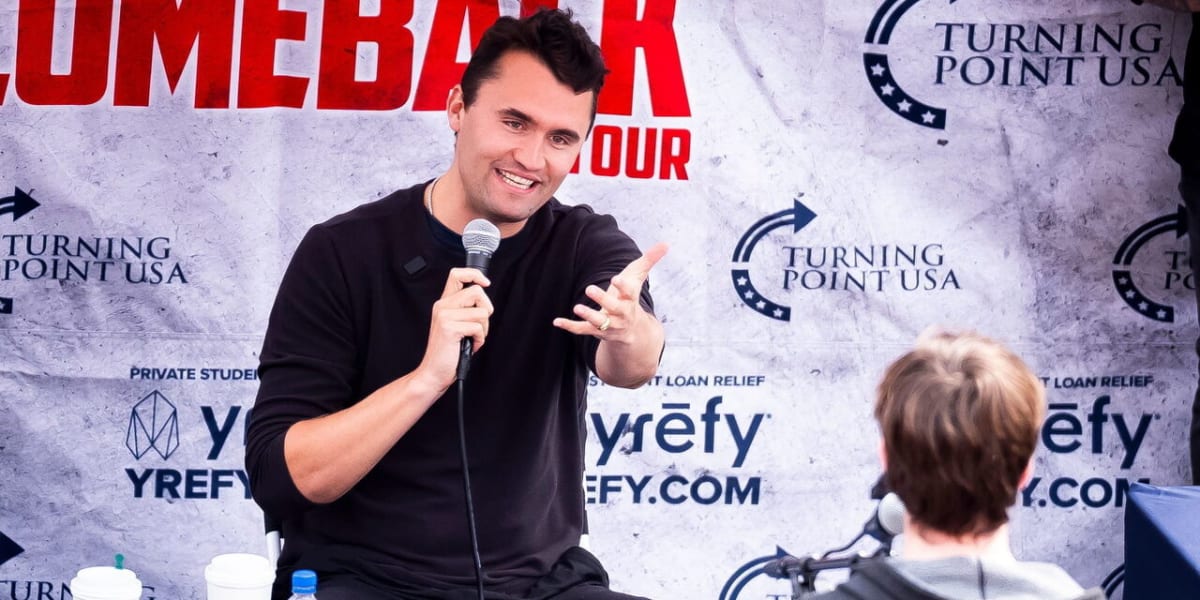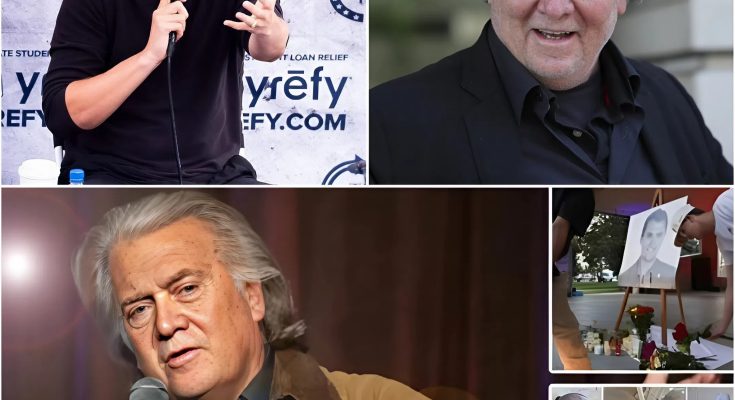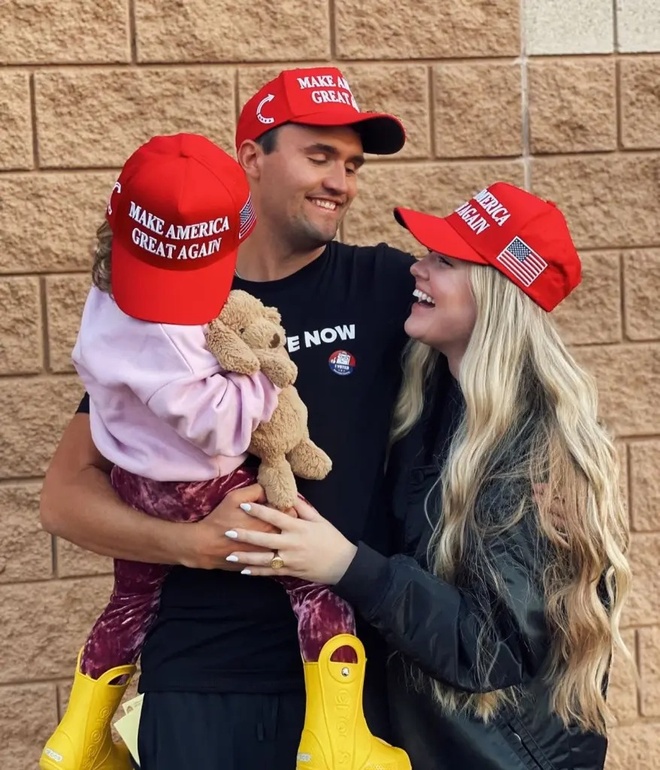Steve Bannon Reveals the Horrifying Truth About Charlie Kirk That Changed Everything — What He Just Said Has Washington Panic!
Washington doesn’t panic easily. It’s a city trained in spin, survival, and the art of pretending that nothing ever surprises it. But last night, for the first time in years, something cracked. It began with a single sentence — spoken quietly, almost reluctantly — by a man who’d spent decades mastering chaos.
Steve Bannon didn’t shout. He didn’t grandstand. He just leaned forward, his voice low and deliberate, and said something that made the air in the room turn heavy.
And within minutes, the story was out.
Phones lit up, journalists scrambled, and what began as an off-record conversation in a smoky D.C. backroom exploded into a national frenzy.
The subject of that revelation: Charlie Kirk.
The Night of the Leak
I was there that evening, though not inside the room itself — only outside, waiting with a handful of other reporters, half-expecting nothing but political gossip. Washington thrives on leaks and late-night whispers, but this one felt different before it even began. There was tension in the air, like everyone knew something was about to rupture.

Bannon had been unusually quiet for months, avoiding interviews, dodging cameras, refusing to comment on anything. When the message came through that he would “finally speak,” nobody knew what to expect.
By 8:00 p.m., the building was swarming with aides and anonymous sources pretending they weren’t supposed to be there. By 8:30, the first rumors began to swirl: It’s about Kirk.
By 9:00, it was chaos.
The Journalist’s Chase
When the door finally opened, reporters surged forward, microphones flashing like strobe lights. Bannon’s expression was unreadable — tired, maybe even haunted. Someone shouted, “What did you mean by that statement?”
He didn’t answer.
But the look in his eyes was enough to set the entire press corps into motion.
That’s how it always begins in this town: a phrase, a look, a pause. You learn to read silence better than speeches.
Within hours, every major newsroom was running with the same headline: “Bannon Reveals Stunning Truth About Charlie Kirk.”
But no one could agree on what that truth actually was.
The Shadow of a Friendship
To understand why Washington was shaking, you have to understand what Bannon and Kirk meant to each other — at least in the public imagination. They weren’t just political allies; they were symbols of a movement that had shaped and divided the nation.

Their friendship was complicated — mentor and protégé, strategist and activist, fire and fuel.
And so when one speaks against the other, even metaphorically, it sends tremors far beyond their immediate circle. It’s not just a personal fracture. It’s a message.
The Quote That Broke the Internet
By morning, a recording had surfaced — grainy, echoing, half-audible. It captured only a few seconds of Bannon’s words, but it was enough:
“The truth was never about politics. It was about what he was willing to do — and what he chose not to stop.”
No context. No elaboration. Just that.
And that was enough to send social media into meltdown.
Hashtags trended. Commentators speculated. Some called it betrayal. Others said it was an act of conscience. But no one could answer the question that mattered most:
What exactly was Bannon talking about?
The Hunt for Meaning
In the following days, I chased the story like every other journalist in D.C. — calling former aides, interns, donors, anyone who might shed light on the meaning behind that phrase.

Most wouldn’t talk. Some hung up the moment they heard the question. But a few did speak — carefully, and only off the record.
“He’s not talking about money,” one source said. “It’s not about corruption or politics. It’s something deeper. Something that scared even him.”
“What do you mean?” I asked.
A long silence. Then, quietly: “Let’s just say there are things that can’t be put in a headline.”
Echoes in the Corridors
In Washington, truth doesn’t travel in straight lines. It moves like fog — shifting, spreading, obscuring.
Every corridor I walked through that week hummed with speculation. Staffers whispered in elevators. Lobbyists avoided eye contact. Even longtime allies began to distance themselves, issuing vague statements about “respecting privacy” and “focusing on the future.”
It was as if everyone had agreed to act as though something enormous had happened — without ever naming what it was.
And that was the most unsettling part: no one wanted to know.
The Silence That Follows
I found Bannon three days later, at a quiet café in Georgetown. He looked older than I remembered, his hair streaked with exhaustion, his hands wrapped around a cup of black coffee he didn’t drink.
“I didn’t mean for it to come out that way,” he said, almost to himself. “But maybe it was time.”
“Time for what?” I asked.

He looked at me, eyes narrowing slightly. “Time for people to remember that every story has a cost. Even the ones that make heroes.”
He stood to leave, dropped a few bills on the table, and added, “You’ll find what you’re looking for if you stop chasing noise and start listening to silence.”
And then he was gone.
Listening to Silence
I spent weeks after that trying to make sense of his words. The more I dug, the more the story unraveled — not into scandal, but into something profoundly human.
The “truth” he had spoken of wasn’t about crime or conspiracy. It was about loyalty, and how easily it curdles into complicity. It was about the moments people choose to look away
when the cost of seeing becomes too high.
Multiple sources confirmed that the two men had fallen out months earlier — quietly, privately — over something that had nothing to do with power or politics, and everything to do with principle.
One aide described it simply:
“They reached a point where one man’s silence became another man’s burden.”
The Human Cost
The more I learned, the less the story felt like politics. It began to feel like a tragedy — not of ideology, but of friendship.
For years, they had built something together — a machine of influence, a network of followers, a shared vision of how to shape the country. But beneath it all, there were disagreements, moral fractures, questions of how far was too far.
And in the end, one man spoke while the other stayed silent.
It wasn’t betrayal. It was confession.
Reverberations in Washington
By the time the Sunday shows aired, every talking head in D.C. had their theory. Some said it was a warning shot. Others said it was a message of guilt. But no one could deny the effect — a visible shift in tone, a collective unease that rippled through committees, think tanks, and media outlets alike.

For years, the two names had been said in the same breath. Now, they were separated by an invisible wall of uncertainty.
Washington had lost its compass again — and for once, it wasn’t about scandal. It was about the uncomfortable truth that people can fight for the same cause, share the same mission, and still walk away questioning what it all meant.
The Private Letter
Weeks later, a letter surfaced — unsigned, but allegedly written by someone close to the inner circle. It wasn’t addressed to anyone directly, but the message was unmistakable:
“You can build an empire on conviction. But if you lose sight of the people inside it, you end up ruling over ghosts.”
Whether or not the letter was genuine didn’t matter. It captured what many in Washington already felt but couldn’t say aloud: that the machinery of politics often devours the very humanity it claims to defend.
A City That Forgets
By late spring, the noise faded. The headlines shifted, the algorithms moved on, and Washington did what it always does best — it forgot.
But for those who had been there that night, the moment lingered like a quiet echo under the marble floors. Something in the city had changed. Not in policy or power, but in perception.
Because once you see behind the curtain, you can’t pretend it’s still magic.
The Last Conversation
Months later, I reached out to Bannon again. This time, he didn’t respond immediately. Then one night, at 2:13 a.m., I received a single text message:
“Truth isn’t what you reveal. It’s what you can still live with after you’ve revealed it.”
I stared at the screen for a long time.
It wasn’t an answer. It was an ending.
What Remains
So what was the horrifying truth that “changed everything”?
It wasn’t a document, or a confession, or a scandal waiting to be exposed. It was the simple, devastating realization that the real battle in politics isn’t between parties — it’s between truth and convenience.
And for a brief moment, in a city addicted to pretending otherwise, someone dared to say it aloud.
Washington panicked because it recognized itself.




